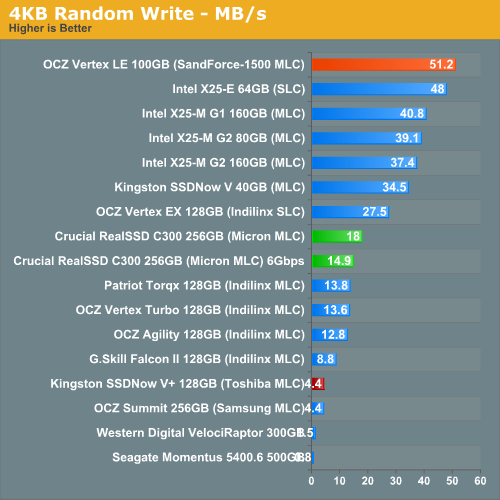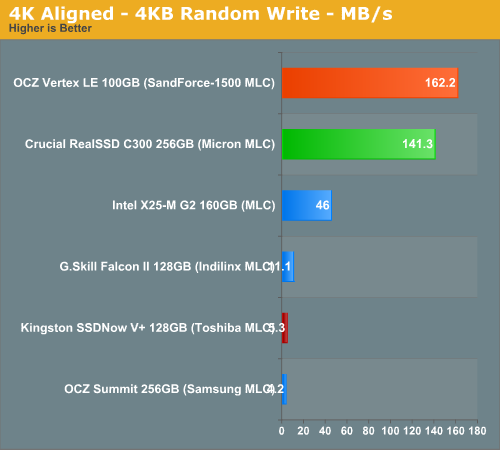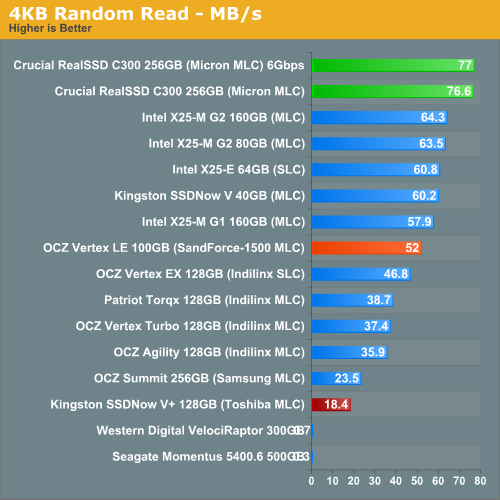OCZ’s Vertex Limited Edition Review & SSD State of the Union
by Anand Lal Shimpi on February 19, 2010 12:00 AM EST- Posted in
- Storage
Random Read/Write Speed
This test writes 4KB in a completely random pattern over an 8GB space of the drive to simulate the sort of random writes that you'd see on an OS drive (even this is more stressful than a normal desktop user would see). I perform three concurrent IOs and run the test for 3 minutes. The results reported are in average MB/s over the entire time.
I've had to run this test two different ways thanks to the way the newer controllers handle write alignment. Without a manually aligned partition, Windows XP executes writes on sector aligned boundaries while most modern OSes write with 4K alignment. Some controllers take this into account when mapping LBAs to page addresses, which generates additional overhead but makes for relatively similar performance regardless of OS/partition alignment. Other controllers skip the management overhead and just perform worse under Windows XP without partition alignment as file system writes are not automatically aligned with the SSD's internal pages.
First up is my traditional 4KB random write test, each write here is aligned to 512-byte sectors, similar to how Windows XP might write data to a drive:

The OCZ Vertex LE does ridiculously well here, outperforming even Intel's X25-E. The Crucial RealSSD C300 does ok, a bit better than the Indilinx drives but no where near as good as the Intel based offerings. The reason being that the C300's controller doesn't actually attempt to reorganize unaligned writes on the fly. Look at what happens to 4K random write performance if we only write to 4K-aligned addresses:

Not only does the Vertex LE jump in performance to over 160MB/s, but so does the RealSSD C300. The Intel and Indilinx drives also get a small boost, but nothing huge by comparison. Modern 4K-aware OSes write data in 4K aligned addresses, which matches up perfectly with the 4K page size on all of these SSDs. You can also guarantee higher performance in older OSes like Windows XP by re-mapping the LBAs on the fly but that requires additional overhead. These newer drives forgo performance under Windows XP, for significantly better performance under Windows Vista/7 and Mac OS X 10.5/6. It makes sense given that Intel's X25-M was designed back in 2005 - 2007 while these newer controllers were more recent endeavors.

Random read performance is great on the C300 but a bit lower on the Vertex LE. None of these drives are posting bad figures here though. For the price the Kingston SSDNow V+ doesn't appear to deliver its worth.










83 Comments
View All Comments
neoflux - Sunday, February 21, 2010 - link
part number is K9HCG08U1M-PCB00, but still can't find a size in nm.neoflux - Monday, February 22, 2010 - link
Further research shows me that no one knows what manufacturing process size these actually are, which I find strange. No reviews include the information, there are no manufacturing spec sheets, etc. Only that they are lead-free and have 48 pins, haha.This all must makes me more curious. How does no one know?
eldiablopotato - Sunday, February 21, 2010 - link
Both the OCZ & Crucial SSDs are nice, since my motherboard can't do 6Gbps can anyone recommend which SSD to get? I'm thinking Crucial SSD, but then again I'm no expert on SSDs like Anand. :PFeedback welcomed.
nivek - Sunday, February 21, 2010 - link
OCZ says they can't get any more sandforce controllers at a low price point. But how does OWC get the same controller for their Mercury Extreme Enterprise SSD. OWC 100GB SSD is priced the same as OCZ Vertex LE 100GB!http://eshop.macsales.com/shop/internal_storage/Me...">http://eshop.macsales.com/shop/internal_storage/Me...
Per Hansson - Sunday, February 21, 2010 - link
Just curious about the missing capacitor, will there not be a big risk of dataloss incase of power outage?Do you know what design changes where done to get rid of the capacitor, where any additional components other than the capacitor removed?
Because it can be bought in low quantities for a quite ok retail price of £16.50 here;
http://www.tecategroup.com/ultracapacitors/product...">http://www.tecategroup.com/ultracapacitors/product...
sjobal - Sunday, February 21, 2010 - link
Hi Anand,I'm curious to know what SSD is most suitable for a mac. Since OSX does not support TRIM, some sort of garbage collection has to be done within the drive (firmware) or a software tool has to be available for OSX.
Is this something you'll look into in forthcoming reviews?
Best regards!
AnnonymousCoward - Saturday, February 20, 2010 - link
Anand,How can you benchmark in so many different ways, and yet end up with hardly any relevant information? All those PCMark graphs don't tell me squat. Your AnandTech Storage Bench is flawed, since (as your last article found) the SandForce uses compression and IOPS don't equal bandwidth! Why does the user care about IOPS?? Do they care about IOPS of their graphics cards? Or CPU?
With CPUs, you measure things like encoding time and game framerates. Things that matter!
This is the 3rd time I'm posting this. Refer to the last time: http://tinyurl.com/yjcr5vm">http://tinyurl.com/yjcr5vm
Zoomer - Sunday, February 21, 2010 - link
It's a waste of time to do what you're suggesting. The point of SSDs is to improve the user response time.Encoding time? It would likely be virtually identical due to the modern pre-fetching algorithms in place.
Game framerates won't really be affected since the average of 3 runs is taken. After the first run, most everything will be cached, either in hardware or in software by the os in mem.
In the real world, you would expect to see less dips in fps (min fps will be higher), assuming it is a fresh first run.
bradley - Sunday, February 21, 2010 - link
The point is germane. New SSD benchmarks are required to measure real world performance. Some of the current benchmarks end up limited to measuring nothing more than cache speed. IOPS is impractical and demonstrates nothing indicative regarding real world performance.the Problem with Write IOPS - in flash SSDs
http://www.storagesearch.com/problem-write-iops.ht...">http://www.storagesearch.com/problem-write-iops.ht...
erple2 - Sunday, February 21, 2010 - link
Ordinarily, I'd agree with you. However, the point of the article was to point out the problems with "older" benchmarks that would simply look at, in a vacuum, IOPS of a drive was inconsistent at best, and misleading at worst. In the case of Anand's testing methodologies, you see that the IOPS numbers he comes up with are, in fact, the "worst case scenario" listed for SSD's in the article you linked to.Until the giant Meltdown of SSD's in Anand's article (http://www.anandtech.com/storage/showdoc.aspx?i=35...">http://www.anandtech.com/storage/showdoc.aspx?i=35..., testing methodologies that benchmark reviewers were using were definitely perfectly suited to the problems with SSD's, namely the write-erase cycle being specifically excluded from the benchmarks. That indicated the main problem storagesearch.com referred to in the above linked article.
Anand has since changed his benchmark methodology for all SSD's to be a "polluted" SSD - he does not simply wipe the drive clean, then benchmark. He first fills the drive with data, then does a format (which does NOT wipe the drive clean - you still have the write-erase cycle to contend with), then runs benchmarks.
The other thing to look at is that the benchmarks that Anand looks at are, in fact, consistent. Saying that one drive attains 600 IOPS on "Anand's light StorageBench" where another attains 500 IOPS _ON THE SAME BENCHMARK_ does, in fact, give you a reasonably accurate comparison. The trouble you'll get into is if you state "Drive X gets 5000 IOPS, but Drive Y gets 9000 IOPS", not mentioning the actual benchmark used, or even worse, cherry-picking the benchmarks to favor the particular Drive. Then, you have to dig down and figured out whether the benchmarks that gave you "5000 IOPS" was, in fact, properly executed - is that really indicative of the performance of the drive, or only in a very tightly controlled environment to maximize performance numbers? However, that's a question you always have to look at regardless of what you're testing, be it video cards (3D Vantage doesn't give you an accurate picture of how well the card will perform in some particular scenario), CPU's (SPECint or SPECfp give you minimal information about how a CPU performs in a large database environment) or other devices.
So really, I think that the point the article in storagesearch is hammering at you should be wary of reading more into generic IOPS as a benchmark for these SSD's as is simply stated.
So, in conclusion, I disagree about 80% with what you have written.
(minor "edit"):
So I've re-read the GGP post - while it is true that IOPS as a number means nothing to me, it also winds up being true that posting a Bandwidth number would also be more or less worthless to me - what is important is the general ranking of these devices in the same benchmark. The benchmark is measuring the _relative_ performance of each of the drives in the same sequence of tests. Taking conclusions like "this drive gets 600 in a benchmark and that one gets 400 in another benchmark" ultimately fails.
(BTW, Anandtech staff, please fix the fact that I can't use any "rich" text in these posts)